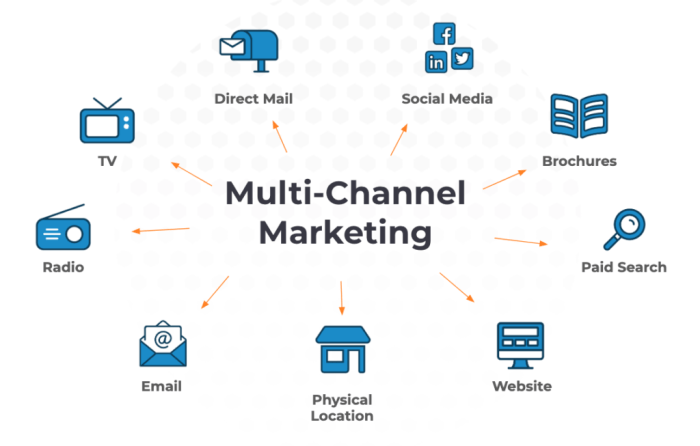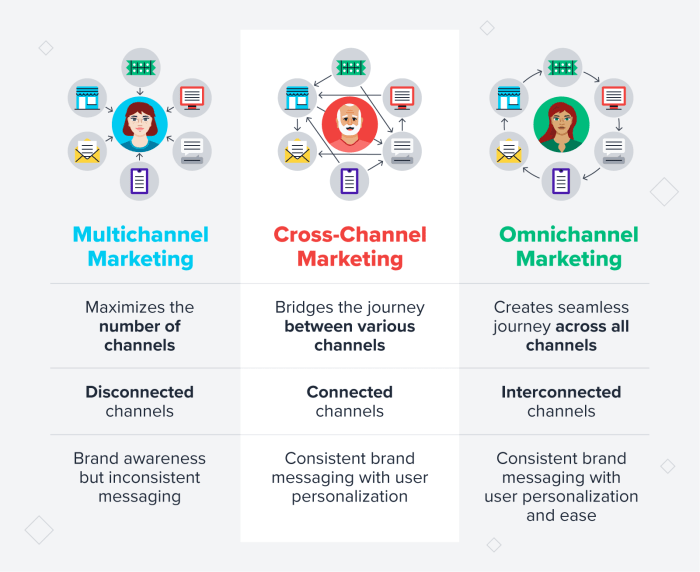Multi-Channel Marketing sets the stage for a dynamic approach to reaching consumers in today’s digital world, blending various platforms to create a seamless brand experience. Get ready to dive into the realm of marketing magic where engagement knows no bounds.
From defining the concept to exploring strategies and challenges, this journey will equip you with the tools to conquer the multi-channel landscape with style and finesse.
Definition of Multi-Channel Marketing

Multi-channel marketing is a strategy that involves reaching customers through various platforms and channels both online and offline. This approach aims to create a seamless and integrated experience for consumers across different touchpoints.In today’s digital landscape, multi-channel marketing is crucial for businesses to engage with their target audience effectively. With consumers interacting with brands through multiple channels such as social media, email, websites, and physical stores, it is essential for companies to have a presence where their customers are present.
Examples of Different Channels Used in Multi-Channel Marketing Strategies
- Social Media: Platforms like Facebook, Instagram, Twitter, and LinkedIn are used by businesses to connect with their audience, share content, and drive engagement.
- Email Marketing: Sending targeted and personalized emails to customers is a common practice in multi-channel marketing to nurture leads and promote products or services.
- Physical Stores: Brick-and-mortar locations provide customers with the opportunity to interact with products in person, complementing online experiences.
- Mobile Apps: Companies develop mobile applications to offer a convenient and personalized experience to users, enhancing their overall brand engagement.
- Online Advertising: Display ads, search engine marketing, and other forms of online advertising help businesses reach their target audience across various websites and platforms.
Benefits of Multi-Channel Marketing
Multi-channel marketing offers various advantages that can significantly impact a brand’s visibility, audience reach, and customer engagement and loyalty.
Increased Brand Visibility
- By utilizing multiple channels such as social media, email, website, and physical stores, a brand can increase its presence in the market.
- Being visible across different platforms allows the brand to stay top-of-mind with consumers and stand out from competitors.
- Consistent messaging across channels reinforces brand identity and recognition among target audiences.
Wider Audience Reach
- Multi-channel marketing enables brands to connect with a diverse range of consumers who prefer different communication channels.
- Reaching customers through various touchpoints increases the chances of engaging with potential buyers at different stages of the purchasing journey.
- Expanding the reach beyond traditional marketing methods helps in tapping into new markets and demographics.
Improved Customer Engagement and Loyalty
- Interacting with customers through multiple channels fosters stronger relationships and builds trust over time.
- Offering personalized experiences based on customer preferences gathered from various touchpoints enhances engagement and loyalty.
- Providing seamless transitions between channels ensures a consistent and positive customer experience, leading to increased satisfaction and loyalty.
Strategies for Implementing Multi-Channel Marketing
Implementing a successful multi-channel marketing campaign requires careful planning and execution to ensure maximum reach and engagement. Consistency across different channels is key to building a strong brand identity and maintaining customer trust. Integrating online and offline channels effectively can help businesses create a seamless customer experience and drive conversions.
Creating a Successful Multi-Channel Marketing Campaign
- Identify your target audience: Understand who your customers are and where they spend their time online and offline.
- Develop a cohesive strategy: Create a unified message and brand voice that can be adapted across all channels.
- Utilize data and analytics: Track customer interactions and behaviors to optimize your marketing efforts.
- Personalize content: Tailor your messaging to specific audience segments to increase engagement and conversions.
Importance of Consistency Across Different Channels
- Builds brand recognition: Consistent messaging and branding help customers easily identify your business across various channels.
- Strengthens brand trust: Customers are more likely to trust brands that maintain a consistent image and voice.
- Improves customer experience: A seamless experience across channels enhances customer satisfaction and loyalty.
Integrating Online and Offline Channels Effectively
- Coordinate messaging: Ensure that your online and offline campaigns are aligned to create a cohesive brand experience.
- Use QR codes and URLs: Drive traffic from offline channels to online platforms by incorporating QR codes and custom URLs.
- Implement omnichannel marketing: Connect online and offline touchpoints to provide a seamless customer journey.
- Track cross-channel performance: Monitor the effectiveness of each channel and adjust your strategy accordingly to maximize results.
Challenges of Multi-Channel Marketing
Implementing a multi-channel marketing strategy can come with its fair share of challenges, which can hinder the success of your marketing campaign. Let’s dive into some common hurdles faced and how to overcome them to ensure a seamless multi-channel approach.
Data Integration
One of the major challenges in multi-channel marketing is integrating data from various channels. Different platforms and tools may store data differently, making it difficult to have a unified view of customer interactions. To overcome this challenge, invest in a robust Customer Relationship Management (CRM) system that can consolidate data from all channels and provide a comprehensive overview of customer behavior.
Channel Attribution
Attributing conversions to the right channels can be tricky in multi-channel marketing. Customers today interact with brands across multiple touchpoints before making a purchase, making it challenging to determine which channel deserves credit for the sale. To address this challenge, use advanced analytics tools to track customer journeys across channels and assign appropriate credit to each touchpoint based on its contribution to the conversion.
Poor Coordination Between Channels, Multi-Channel Marketing
When channels within a multi-channel marketing strategy are not aligned or coordinated, it can lead to a disjointed customer experience and inconsistent messaging. This lack of coordination can confuse customers and dilute the impact of your marketing efforts. To mitigate this challenge, ensure that all channels work together seamlessly, with consistent branding, messaging, and offers across platforms. Effective communication and collaboration between teams handling different channels are key to maintaining a cohesive marketing campaign.
Measurement and Analytics in Multi-Channel Marketing

In the world of multi-channel marketing, measuring success and analyzing data are crucial components to optimizing campaigns and achieving desired outcomes.
Key Metrics for Measuring Success
- Conversion Rate: The percentage of website visitors who take a desired action, such as making a purchase or signing up for a newsletter.
- Customer Lifetime Value (CLV): The predicted revenue a customer will generate throughout their relationship with a business.
- Return on Investment (ROI): The ratio of the revenue generated to the cost of the marketing campaign.
Role of Analytics in Optimization
Analytics play a vital role in multi-channel marketing by providing insights into customer behavior, preferences, and interactions across various channels. By analyzing data, marketers can identify trends, optimize campaigns, and tailor messages to specific target audiences.
Tools and Technologies for Tracking and Analysis
Google Analytics
Google Analytics is a popular tool used to track website traffic, user behavior, and conversions across different channels. It provides valuable insights into the effectiveness of marketing campaigns and helps marketers make data-driven decisions.
Marketing Automation Platforms
Platforms like HubSpot, Marketo, and Pardot offer robust analytics capabilities that allow marketers to track and measure the performance of multi-channel campaigns. These tools enable marketers to automate tasks, personalize content, and analyze campaign effectiveness.
Customer Relationship Management (CRM) Systems
CRM systems such as Salesforce, Zoho CRM, and Microsoft Dynamics provide insights into customer interactions, preferences, and purchase history. By integrating CRM data with multi-channel marketing efforts, marketers can create targeted campaigns and improve customer engagement.